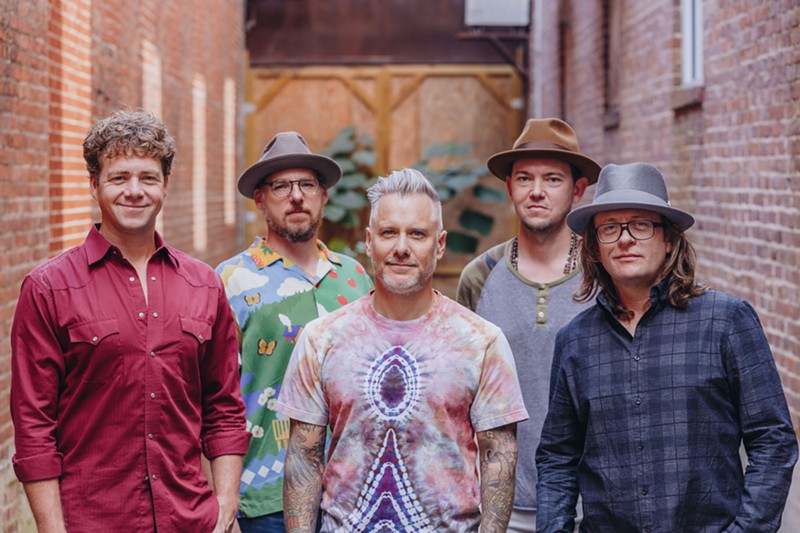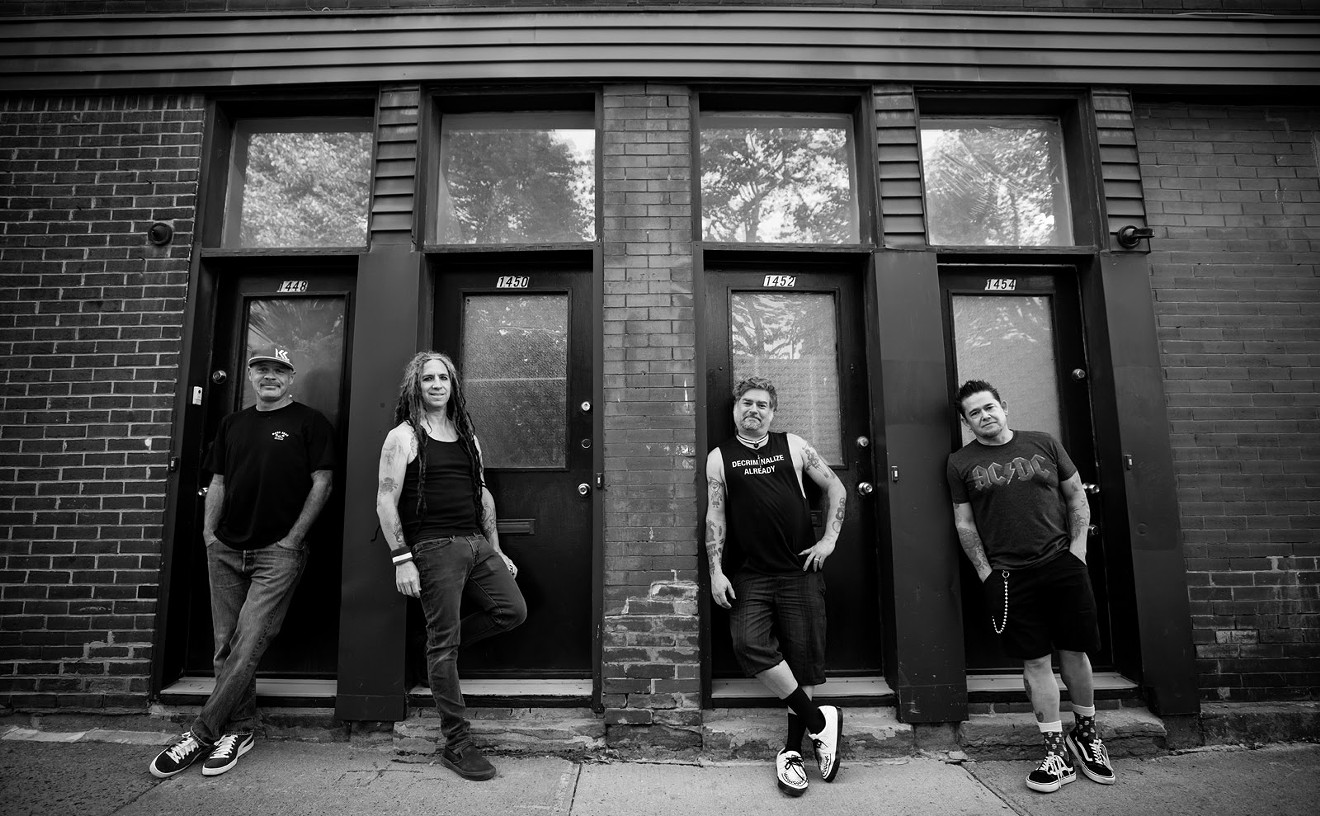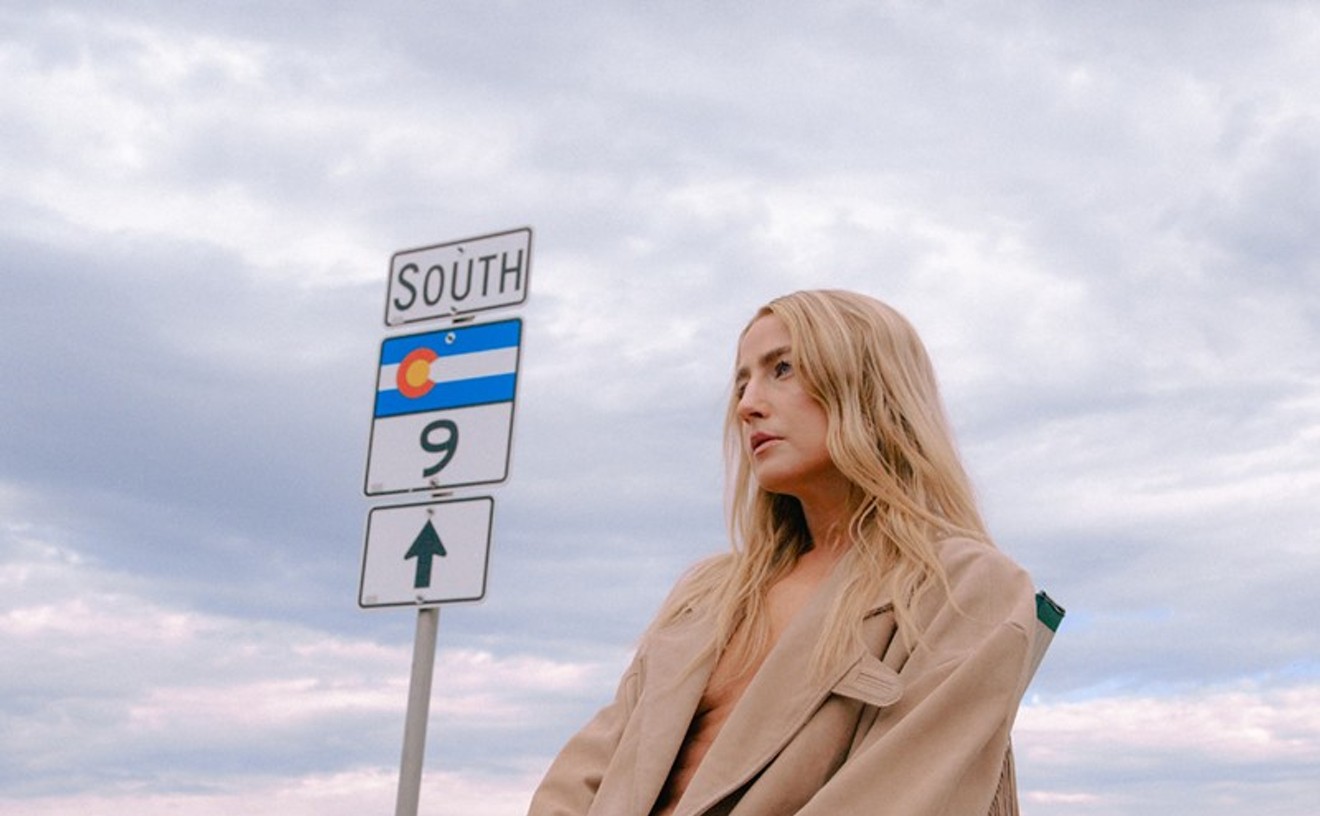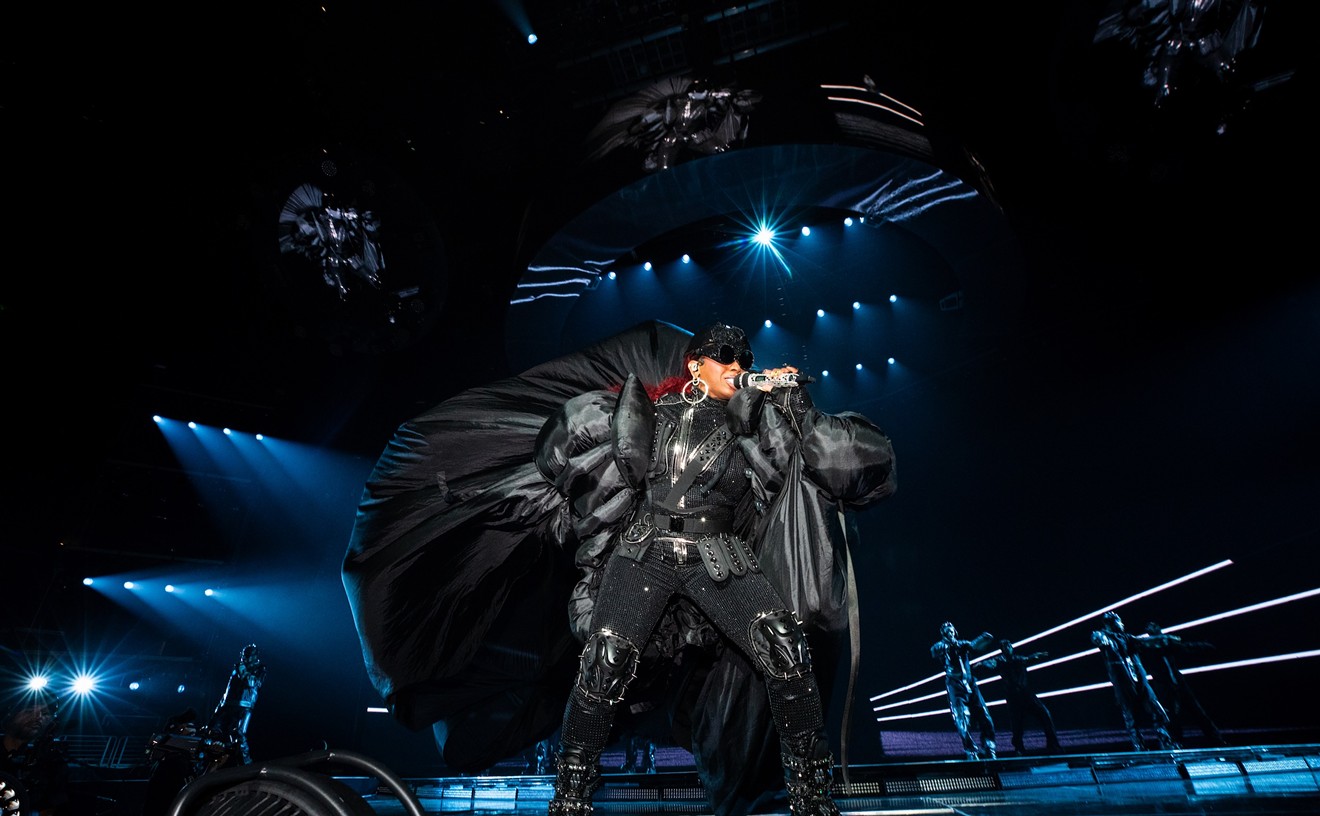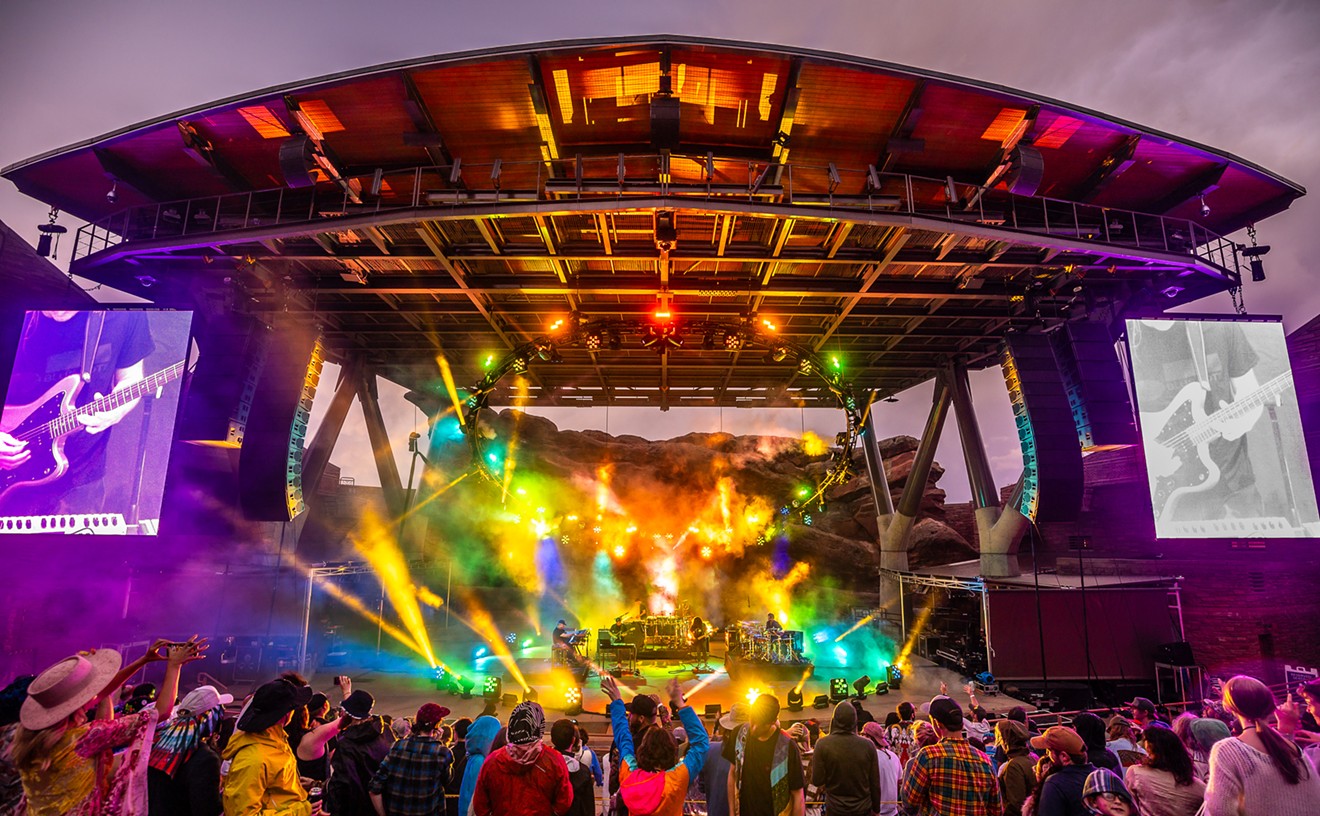The Infamous Stringdusters stand tall among the crop of progressive bluegrass outfits that proudly take cues from Colorado-based trailblazers such as the String Cheese Incident, Leftover Salmon and Yonder Mountain String Band. The Dusters, which initially got their start in Nashville and now have members based in Denver, represent an accomplished blend of the traditional and progressive influences that help define the jamgrass genre.
The Dusters have been teasing their tenth album, Toward the Fray, with singles before its release tomorrow, Friday, February 18. Westword caught up with the bluegrass band's guitarist and vocalist, Andy Falco, to get the inside scoop on the new drop and what the group has been doing during COVID times.
Westword: How did you come to meet the other members of the band?
Andy Falco: We all sort of met at different times, but I knew Chris Pandolfi (banjoist) independently of Andy Hall (dobro player). They're both originally New Yorkers, as am I, but from different parts of the state. We knew each other from the Northeast bluegrass scene, where we had hung out and jammed together at festivals like the Grey Fox Bluegrass Festival, in upstate New York, and the Joe Val Bluegrass Festival, just outside of Boston. Joe Val was a mandolin player who passed away, and they named a festival after him. That's where I connected with those guys, although separately. Then Andy moved down to Nashville, and shortly after that, Pandolfi also moved to Nashville along with Chris Eldridge, who was our first guitar player. I moved down there not long after they did. They put the band together in Nashville, and about a year after their first album was released, I joined the group.
So you ended up in Nashville, where other members of the Dusters were living, and you all started to pursue a sound that was steeped in bluegrass, but I've heard you say that you weren't really a big bluegrass player in terms of your background at that point.
Yeah, I grew up listening to stuff like my parents' Beatles albums, and then through my older brother, Tom, who played a big role in influencing my musical interests, I got turned on to the Grateful Dead. I went to my first Dead show in 1986. He signed me out of school one day and took me to Hartford, Connecticut, to see them play. I was into it, and he also played guitar and encouraged me to jam with him, and I eventually started forming bands as early as the eighth grade. We played a lot of classic rock and jam-influenced music. It was the beginning of my career.
Later on in college, I was in a group that was sort of a jammy blues band. We were also into the Allman Brothers, which to me was kind of like the Grateful Dead on steroids. We played a lot of improvisational music. Through the Grateful Dead and Allman Brothers thing, I started getting more into blues and also bluegrass, and we started bringing those influences into our electric thing. Then I met a guy named Buddy Merriam, who is a Long Island mandolin player who got a lot of his influence directly from Bill Monroe. His story is interesting. He was basically struck by lightning at what is now the site of the Grey Fox Bluegrass Festival in New York. Back then I think it was called the Berkshire Mountain Music Festival. But Monroe heard about him and took him under his wing, and they were friends until Monroe passed away. He lives on Long Island and has a bluegrass band. But we met him and started incorporating him into our sound, with him sitting in and stuff. It was in the mid- to late ’90s, and we started doing this hybrid bluegrass/jam thing, kind of similar to what was going on out in Colorado.
Eventually I joined Buddy's band, and that's when I started committing to bluegrass and learning how to do it. When I moved down to Nashville, I played in a few bands there before joining the Stringdusters in September 2007. When I moved to Nashville, I was trying to reinvent myself as a bluegrass picker. I was able to see all my heroes up close and personal, which was amazing, but even though I was trying to immerse myself in the tradition of it all, I couldn't shed my musical DNA, which included stuff like my jam influences and all of that. So I just stopped trying to do that, and instead I just evolved as myself. I think we all did that. We learned a lot of bluegrass, but we kept our other sensibilities. Now my playing has become more of a blended voice.
When you started learning how to flat-pick, were there any players who you were trying to emulate?
I listened to a lot of records by people like Tony Rice, Clarence White and Doc Watson. I also remember checking out a workshop at a festival in New York by a guitar player named Jack Lawrence who was part of Doc Watson's band. Doc was there, and I got to watch Jack and Doc play close up, and it really inspired me. So through various influences, including my brother Tom [and] Buddy Merriam, and from watching Doc and Jack, I got inspired enough to want to start playing bluegrass. My first time actually hearing the flat-picking style was listening to David Bromberg. He was a bridge between blues, which I liked, and bluegrass, which I eventually learned to play.
How did the name the Infamous Stringdusters come into being?
It was before I was in the band, but our previous guitarist Chris Eldridge's father, Ben Eldridge, who played banjo for the progressive bluegrass band the Seldom Scene, suggested the name the Stringdusters. But there was another band called the Stringdusters, so they had to add something to it to make it legal, and so they became the Infamous Stringdusters.
That's you singing on the title track of Toward the Fray?
Yeah, that's me.
Your voice sounds great. It works well with the theme and vibe of the art.
Well, thanks. I did my best to get into the feeling. I sang that track live along with the band to record it. That helped me get into it. People like Jerry Garcia aren't considered great singers, but what he did really well was to emote and tell the stories in his songs and get into character. I try to do that. Instead of approaching it as just a vocal track, I like to play along with the guitar and cut the vocal live to get the right feel. So what you're hearing is a live take.
What else can you tell me about this new album?
It was done a little differently. Our albums all get done in their own ways, but this one is really a result of the pandemic, during which we were all isolated and writing separately. Normally we'd get together and play through a whole bunch of songs and figure out the release over a few months, or while on tour or whatever, but we really didn't have that with 2020. So we all just kind of cut our own demos and sent them around to each other. For the singers, we all did three songs each, and Pandolfi did an instrumental, which is on there. When we finally met up in Denver to play through the tunes, we hadn't seen each other in six months. We didn't overthink these songs; we just played them, got the initial spark from them and then went in and recorded them. So it was a little bit different than past records where we did more pre-production and planning out. It's its own thing, which is great. I'm proud of it. I think we've all really evolved as songwriters. We share writing credit on all our tunes, because by the time our songs are finished, we've all put our imprint on them.
[
{
"name": "Air - MediumRectangle - Inline Content - Mobile Display Size",
"component": "12017618",
"insertPoint": "2",
"requiredCountToDisplay": "2",
"watchElement": ".fdn-content-body",
"astAdList": [
{
"adType": "rectangle",
"displayTargets": "mobile"
}
]
},{
"name": "Editor Picks",
"component": "17242653",
"insertPoint": "4",
"requiredCountToDisplay": "1",
"watchElement": ".fdn-content-body",
"astAdList": [
{
"adType": "rectangle",
"displayTargets": "desktop|tablet"
},{
"adType": "rectangle",
"displayTargets": "desktop|tablet|mobile"
}
]
},{
"name": "Inline Links",
"component": "18838239",
"insertPoint": "8th",
"startingPoint": 8,
"requiredCountToDisplay": "7",
"maxInsertions": 25
},{
"name": "Air - MediumRectangle - Combo - Inline Content",
"component": "17261320",
"insertPoint": "8th",
"startingPoint": 8,
"requiredCountToDisplay": "7",
"maxInsertions": 25,
"watchElement": ".fdn-content-body",
"astAdList": [
{
"adType": "rectangle",
"displayTargets": "desktop|tablet"
},{
"adType": "rectangle",
"displayTargets": "desktop|tablet|mobile"
}
]
},{
"name": "Inline Links",
"component": "18838239",
"insertPoint": "8th",
"startingPoint": 12,
"requiredCountToDisplay": "11",
"maxInsertions": 25
},{
"name": "Air - Leaderboard Tower - Combo - Inline Content",
"component": "17261321",
"insertPoint": "8th",
"startingPoint": 12,
"requiredCountToDisplay": "11",
"maxInsertions": 25,
"watchElement": ".fdn-content-body",
"astAdList": [
{
"adType": "leaderboardInlineContent",
"displayTargets": "desktop|tablet"
},{
"adType": "tower",
"displayTargets": "mobile"
}
]
}
]

